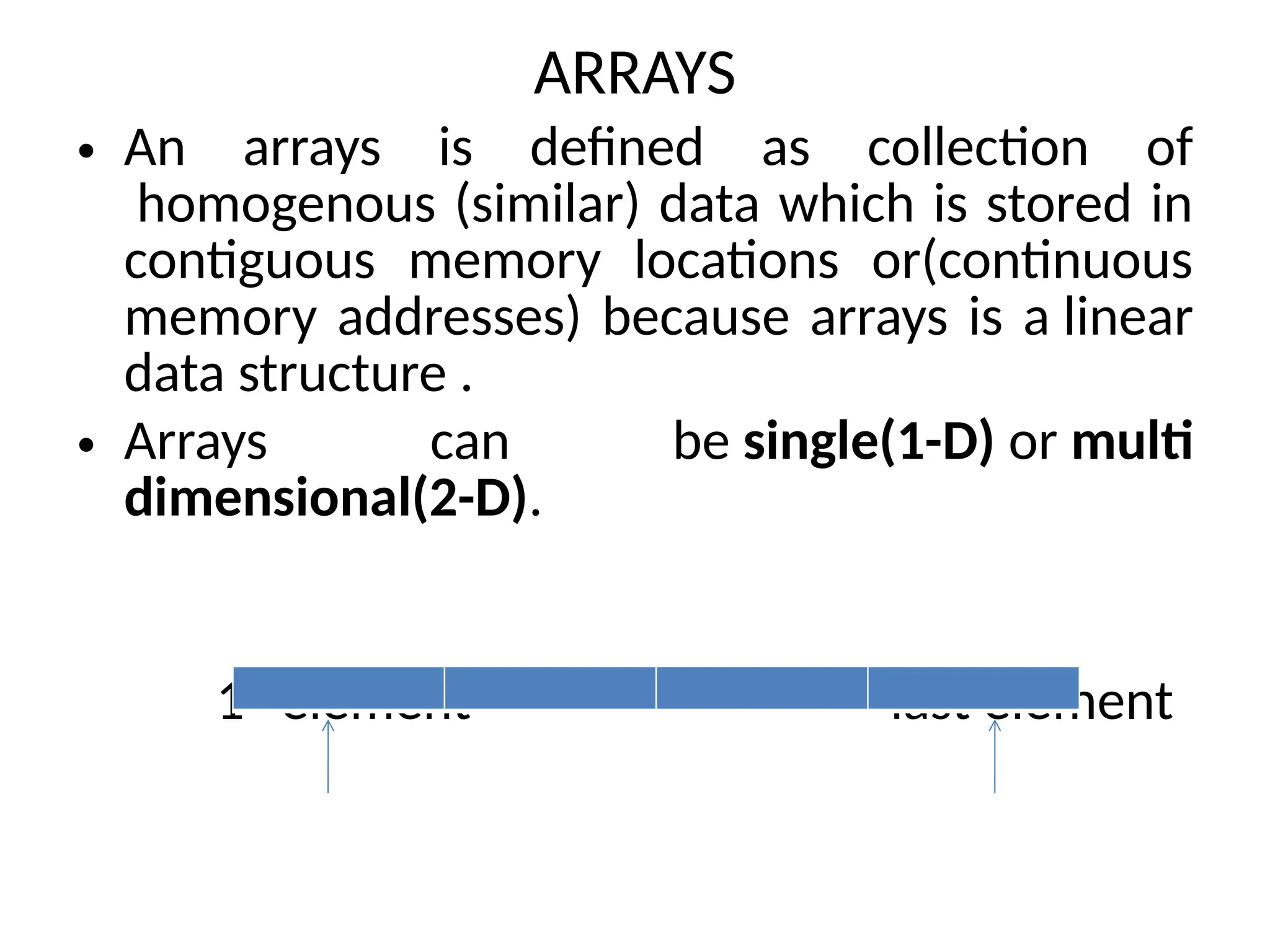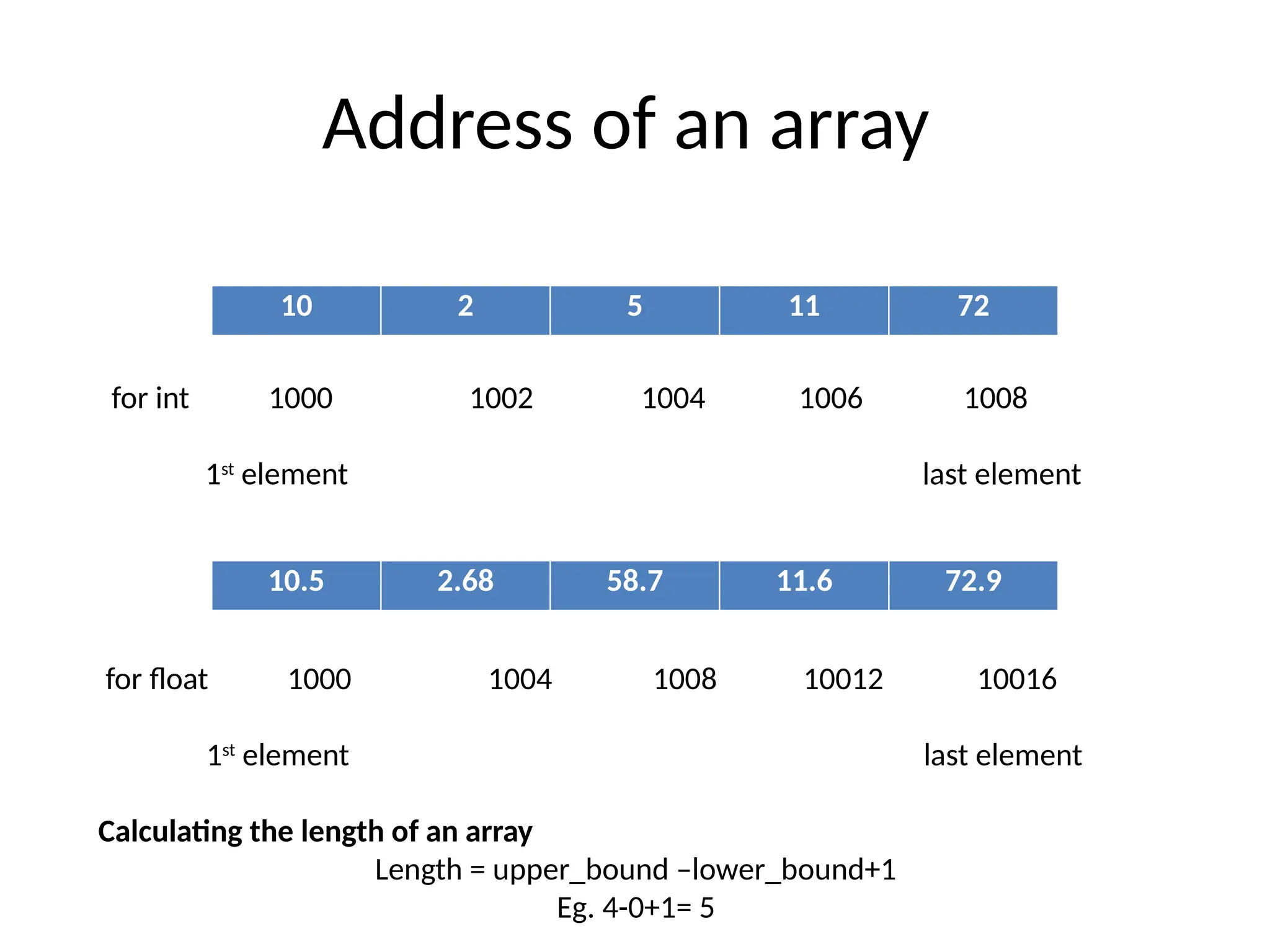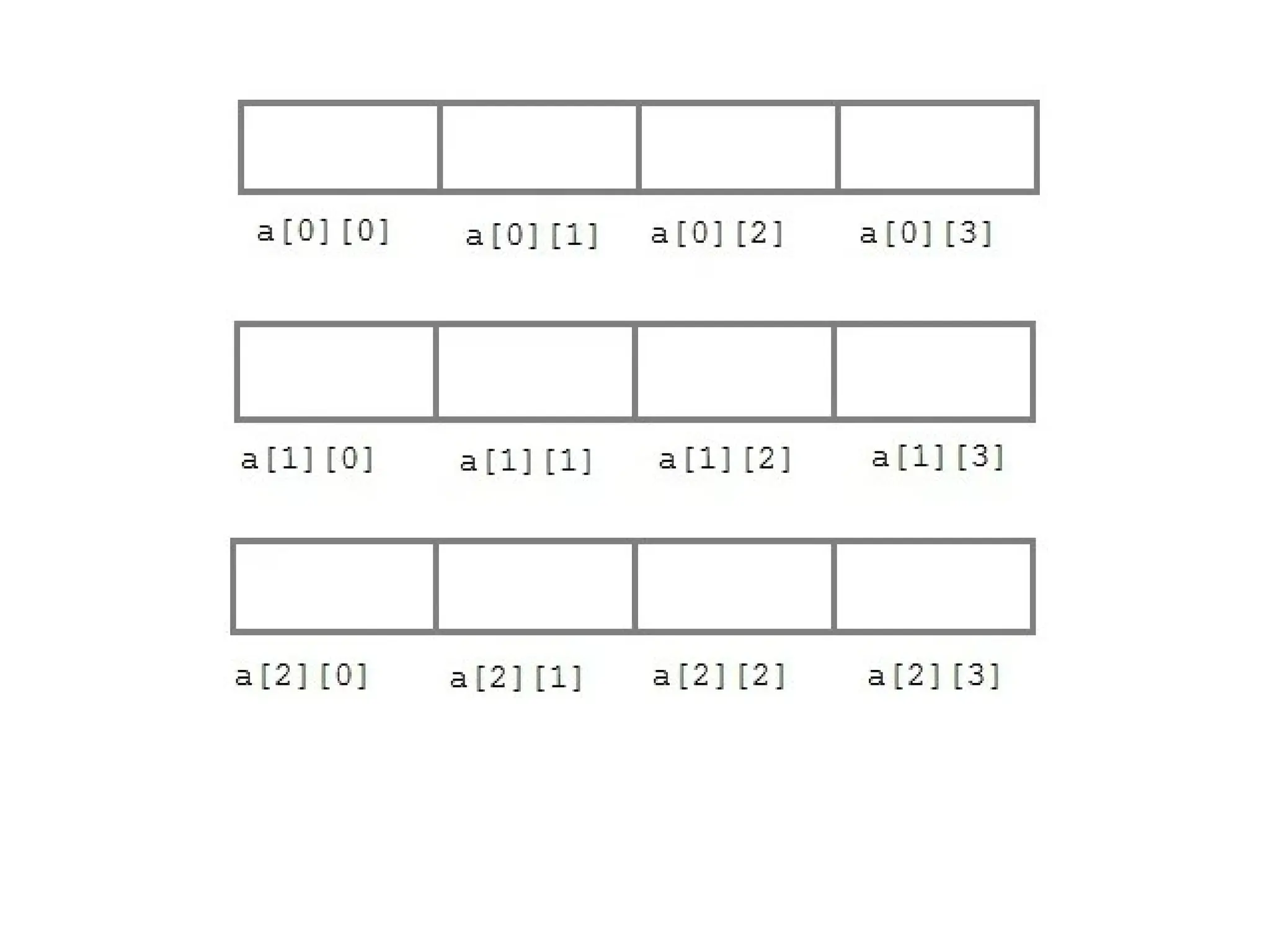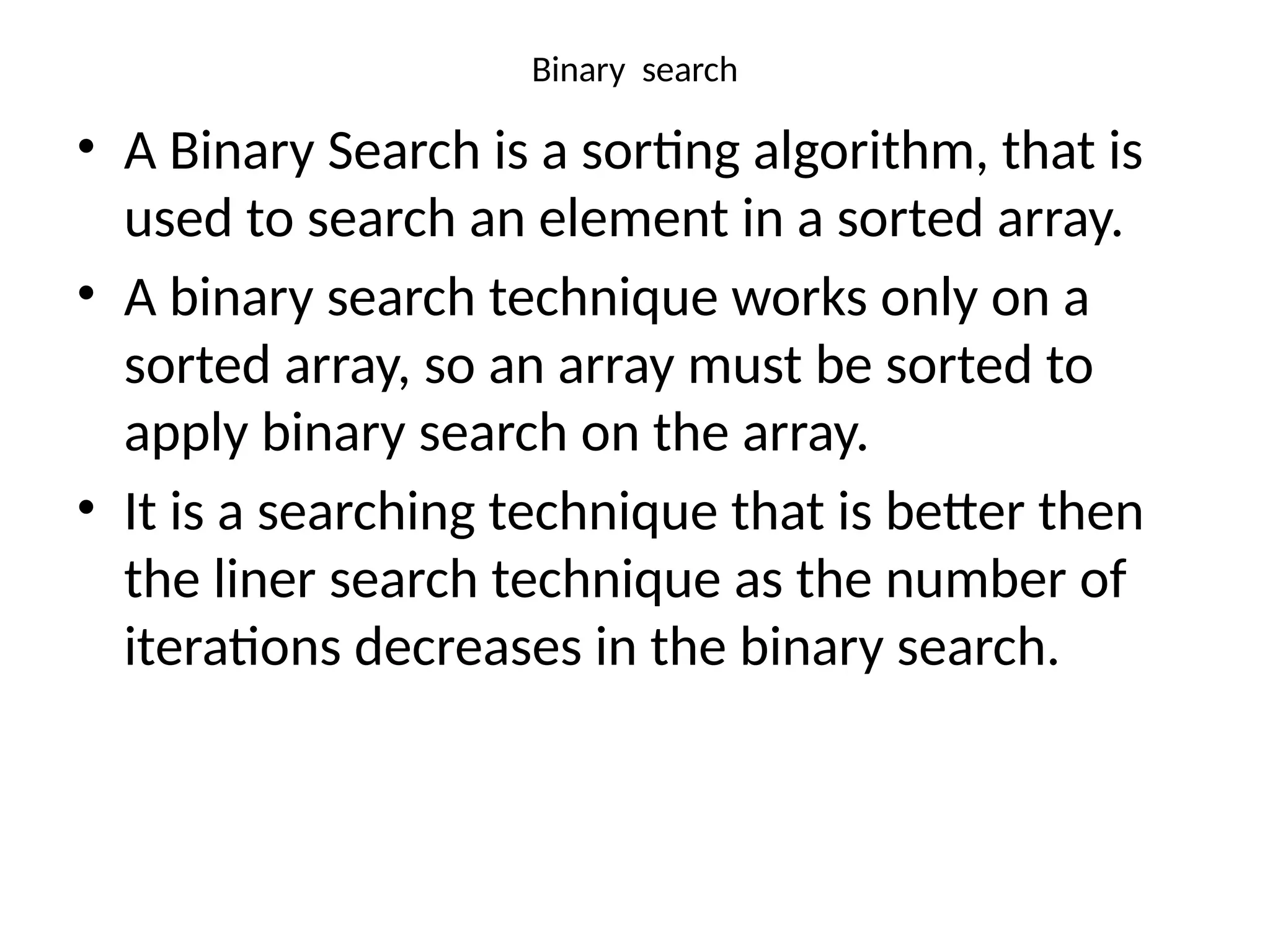The document explains arrays as collections of homogeneous data in contiguous memory locations, covering single and multi-dimensional arrays. It details declaration, initialization, accessing elements, and operations such as inserting, deleting, reversing, and merging arrays, along with examples in C programming. The document also introduces linear search algorithms, emphasizing how to search for elements within an array.


![Declaring Arrays
data-type variable-name[size];
Examples:-
char a[5]; /* char type value array */
float a[9]; /* float type value array */
int a[10]; /* int type value array */
a[0],a[1]…. Are known as index
The index of an array starts from 0 to size-1 means first
element of any array will be stored at a[0] address
and the last element will be at a[size - 1].](https://image.slidesharecdn.com/arrays-241127194959-6170d8e4/75/array-ppt-of-c-programing-language-for-exam-3-2048.jpg)
![Initialization of Array
• After declaration it is necessary to initialize an
array. Otherwise, it will contain garbage value(
random value). An array can be initialized at
either compile time or at runtime. No validity
check for array index not available in c.
Compile time Initialization :- It means that
providing the value to an array in the code,
during creation of it.
Syntax:-
data-type arrayname[size] = { list of values };](https://image.slidesharecdn.com/arrays-241127194959-6170d8e4/75/array-ppt-of-c-programing-language-for-exam-4-2048.jpg)
![• int a[4] = { 67, 87, 56, 77 };
• float a[5] = { 23.4, 6.8, 5.5 };
• int marks[4] = { 67, 87, 56, 77, 59 }; // Compile time error .
• If the values are more than the declared array size than
the compiler will give an error.
Example:-
1. #include<stdio.h>
2. void main()
3. {
4. int i;
5. int a[] = {1, 3, 4};
6. for(i = 0 ; i < 3 ; i++)
7. {
8. printf("%dn",a[i]);
9. }
10. }](https://image.slidesharecdn.com/arrays-241127194959-6170d8e4/75/array-ppt-of-c-programing-language-for-exam-5-2048.jpg)
![• #include<stdio.h>
• int main(){
• int arr[5] = {1,-1,3};
• printf("Array elements are:");
• for(int i = 0; i < 5; i++)
• printf("%d ", arr[i]);
• return 0;
• }
Rest two place will be initialized with 0. if
int arr[5] ={} if this will leave blank , compiler will
give the error.](https://image.slidesharecdn.com/arrays-241127194959-6170d8e4/75/array-ppt-of-c-programing-language-for-exam-6-2048.jpg)
![• #include<stdio.h>
• int main(){
• float arr[3] = {1.5,-
1.10,3.8};
• printf("Array elements
are:");
• for(int i = 0; i < 3; i++)
• printf("%f ", arr[i]);
• return 0;
• }
• #include<stdio.h>
• int main(){
• char arr[3] = {'a','b','c'};
• printf("Array elements
are:n");
• for(int i = 0; i < 3; i++)
• printf("%cn", arr[i]);
• return 0;
• }](https://image.slidesharecdn.com/arrays-241127194959-6170d8e4/75/array-ppt-of-c-programing-language-for-exam-7-2048.jpg)
![Runtime Array initialization
• An array can also be initialized at runtime
using scanf() function. Means user will provide
the values. This approach is usually used for
initializing large arrays.
Example:-
1. scanf("%d", &a[1]); // means index 0 but
position first.
2. for(int i = 0; i < 10; i++)
scanf("%d", &a[i]);
3. for(int i = 0; i < 10; i+=2)
scanf("%d", &a[i]);](https://image.slidesharecdn.com/arrays-241127194959-6170d8e4/75/array-ppt-of-c-programing-language-for-exam-8-2048.jpg)
![Accessing Array elements
Accessing an array elements or printing
Example:-
for(int i = 0; i < 10; i++)
printf("%d", a[i]);
To access and print elements at specified index
printf("%d", a[0]);
printf("%d", a[5]);
NOTE:- if we try to access elements, more than the size
of an array or less than 0,then it won’t show an error
but will produce the wrong output (garbage value).](https://image.slidesharecdn.com/arrays-241127194959-6170d8e4/75/array-ppt-of-c-programing-language-for-exam-9-2048.jpg)
![WAP to calculate sum of elements of array.
• #include<stdio.h>
• int main(){
• int arr[5];
• printf("Enter array elements:"");
• for(int i = 0; i < 5; i++)
• scanf("%d", &arr[i]);
• printf("Array elements are:"");
• for(int i = 0; i < 5; i++)
• printf("%d ", arr[i]);
• int sum = 0;
• for(int i = 0; i < 5; i++)
• sum += arr[i];
• printf("Sum =%d", sum);
• }](https://image.slidesharecdn.com/arrays-241127194959-6170d8e4/75/array-ppt-of-c-programing-language-for-exam-10-2048.jpg)
![WAP to copy date from one array to other
• #include <stdio.h>
• int main()
• {
• int a[5] = {1,2,2,4,5}, a2[5];
• for(int i = 0; i < 5; i++)
• a2[i] = a[i];
• for(int i = 0; i < 5; i++)
• printf("%d ", a2[i]);
• return 0;
• }](https://image.slidesharecdn.com/arrays-241127194959-6170d8e4/75/array-ppt-of-c-programing-language-for-exam-11-2048.jpg)
![• #include<stdio.h>
• int main(){
• int a[10];
• printf("Array elements are:n");
• for(int i = 0; i < 10; i++)
• {
• if (i<4)
• a[i]= 1;
• else if(i>=4&&i<7)
• a[i]= 2;
• else
• a[i]= 0;
• printf("%dn", a[i]);
• }
• return 0;
• }](https://image.slidesharecdn.com/arrays-241127194959-6170d8e4/75/array-ppt-of-c-programing-language-for-exam-12-2048.jpg)
![• Program to insert an elements at specific place in array.
• #include <stdio.h>
• int main()
• {
• int a[10],i,in,e;
• printf("enter elements in array n");
• for(i=0;i<5;i++)
• {
• scanf("%d",&a[i]);
• printf("%dt",a[i]);
• }
• printf("nenter elements and indexn");
• scanf("%dn%d",&e,&in);
• for(i=5;i>=in; i--)
• {
• a[i+1]=a[i];
• }
• a[in]=e;
• for(i=0;i<6;i++)
• {
• printf("%dt",a[i]);
• }
• return 0;
• }](https://image.slidesharecdn.com/arrays-241127194959-6170d8e4/75/array-ppt-of-c-programing-language-for-exam-13-2048.jpg)
![Program to delete an elements from an array.
• #include <stdio.h>
• int main()
• {
• int a[5],i,in;
• printf("enter elements in array n");
• for(i=0;i<5;i++)
• scanf("%d",&a[i]);
• printf("enter index from where you want to delete elementsn");
• scanf("%d",&in);
• for(i=in;i<5;i++)
• a[i]=a[i+1];
• printf("after deletionn");
• for(i=0;i<4;i++)
• printf("%d",a[i]);
• return 0;
• }](https://image.slidesharecdn.com/arrays-241127194959-6170d8e4/75/array-ppt-of-c-programing-language-for-exam-14-2048.jpg)
![Examples
• Program to reverse elements of an array.
#include <stdio.h>
int main()
{
int a[5],i;
printf("enter elements in array n");
for(i=0;i<5;i++)
scanf("%d",&a[i]);
printf("elements of arrayn");
for(i=4;i>=0;i--)
printf("%d",a[i]);
return 0;
}](https://image.slidesharecdn.com/arrays-241127194959-6170d8e4/75/array-ppt-of-c-programing-language-for-exam-15-2048.jpg)
![Merging of two arrays
• #include <stdio.h>
• int main()
• {
• int i,in=0;
• int a[3]={2,3,4}, b[3]={5,6,7}, c[6];
• for(i=0;i<3;i++)
• {
• c[in]= a[i];
• in++;
• }
• for(i=0;i<3;i++)
• {
• c[in]= b[i];
• in++;
•
• }
• for(i=0;i<6;i++)
• {
• printf("%d",c[i]);
• }
• return 0;
• }](https://image.slidesharecdn.com/arrays-241127194959-6170d8e4/75/array-ppt-of-c-programing-language-for-exam-16-2048.jpg)
![Find the largest & smallest element in an array
• #include <stdio.h>
• int main() {
• int n;
• int a[5];
• for (int i = 0; i < 5; i++)
• {
• scanf("%d", & a[i]);
• }
• for (int i = 0; i < 5; i++) {
• if (a[0] < a[i]) {
• a[0] = a[i];
• }
• }
• printf("Largest element = %d", a[0]);
• return 0;
• }
• #include <stdio.h>
• int main() {
• int n;
• int a[5];
• for (int i = 0; i < 5; i++)
• {
• scanf("%d", & a[i]);
• }
• for (int i = 0; i < 5; i++) {
• if (a[0] > a[i]) {
• a[0] = a[i];
• }
• }
• printf("smallest element = %d", a[0]);
• return 0;
• }](https://image.slidesharecdn.com/arrays-241127194959-6170d8e4/75/array-ppt-of-c-programing-language-for-exam-17-2048.jpg)
![Two dimensional Arrays
• It is also known as multidimensional array. It
contains a row index and a column index. Both
the row's and column's index begins with 0.
• Just like a one-dimensional array, Compile
time and runtime initialization of two
dimensional array is possible.
Declaration:-
data-type array-name[row-size][column-size]
Example:-
int a[3][4];](https://image.slidesharecdn.com/arrays-241127194959-6170d8e4/75/array-ppt-of-c-programing-language-for-exam-18-2048.jpg)

![Compile-time initialization
Examples:-
int a[2][2] = {1, 2, 3, 4}; // {{1, 2},{3, 4}}
Int a[2][3] = {1, 2, 3, 4}; // {{1, 2, 3},{4}}
int a[2][4] = {1, 2, 3, 4}; // {{1,2,3,4}}
First of all the values are stored in first row, and then if there is
any extra value, it goes to next row.
Example:-
int a[][3] = {
{0,0,0},
{1,1,1}
}; // no any values is assigned to row in array. It means that
initialization of any number of rows. But must specify number
of columns, else it will give a compile time error.](https://image.slidesharecdn.com/arrays-241127194959-6170d8e4/75/array-ppt-of-c-programing-language-for-exam-20-2048.jpg)
![Runtime initialization
WAP to show the Runtime initialization
• #include<stdio.h>
• void main()
• {
• int arr[3][4];
• int i, j, ;
• printf("Enter array elements:n");
• for(i = 0; i < 3;i++)
• {
• for(j = 0; j < 4; j++)
• {
• scanf("%d", &arr[i][j]);
• }
• }
• for(i = 0; i < 3; i++)
• {
• for(j = 0; j < 4; j++)
• {
• printf("%d", arr[i][j]);
• }
• }
• }](https://image.slidesharecdn.com/arrays-241127194959-6170d8e4/75/array-ppt-of-c-programing-language-for-exam-21-2048.jpg)
![We can also initialize 2D arrays like this
int a[2][4] = { {0, 1, 2, 3} , {4, 5, 6, 7} };
or
int a[2][4] = {0,1,2,3,4,5,6,7};
Both are equivalent
Int [2][4] ={0} ;// all initialized with zero
int [3][4]= {1,1,1,1,2,2,2,2}
firstly 1 1 1 1
2 2 2 2
This row will be initialized by 0](https://image.slidesharecdn.com/arrays-241127194959-6170d8e4/75/array-ppt-of-c-programing-language-for-exam-22-2048.jpg)
![Calculate the sum of all the elements
• #include<stdio.h>
• int main()
• {
• int arr[2][3];
• int i, j,sum =0;
• printf("Enter array elements:n");
• for(i = 0; i < 2;i++)
• {
• for(j = 0; j < 3; j++)
• {
• scanf("%d", &arr[i][j]);
• }
• }
• for(i = 0; i < 2; i++)
• {
• for(j = 0; j < 3; j++)
• {
• printf("%dt", arr[i][j]);
• sum= sum+arr[i][j];
•
• }
• printf("n");
• }
• printf("n%d", sum);
• }
• #include<stdio.h>
• int main()
• {
• int arr[2][3];
• int i, j,sum =0;
• printf("Enter array elements:n");
• for(i = 0; i < 2;i++)
• {
• for(j = 0; j < 3; j++)
• {
• scanf("%d", &arr[i][j]);
• }
• }
• for(i = 0; i < 2; i++)
• {
• for(j = 0; j < 3; j++)
• {
• printf("%dt", arr[i][j]);
• sum= sum+arr[i][j];
•
• }
• printf("n");
• printf("n%dn", sum);
• }
•](https://image.slidesharecdn.com/arrays-241127194959-6170d8e4/75/array-ppt-of-c-programing-language-for-exam-23-2048.jpg)
![//Printing two matrix
• #include<stdio.h>
• int main()
• {
• int a[2][3],b[2][3];
• int i, j;
• printf("Enter array elements:n");
• for(i = 0; i < 2;i++)
• {
• for(j = 0; j < 3; j++)
• {
• scanf("%d", &a[i][j]);
• }
• }
• for(i = 0; i < 2;i++)
• {
• for(j = 0; j < 3; j++)
• {
• scanf("%d", &b[i][j]);
• }
• }
• printf("1st matrixn");
• for(i = 0; i < 2; i++)
• {
• for(j = 0; j < 3; j++)
• {
• printf("%dt", a[i][j]);
• }
• printf("n");
• }
• printf("2nd matrixn");
• for(i = 0; i < 2; i++)
• {
• for(j = 0; j < 3; j++)
• {
• printf("%dt", b[i][j]);
• }
• printf("n");
• }
• }
•](https://image.slidesharecdn.com/arrays-241127194959-6170d8e4/75/array-ppt-of-c-programing-language-for-exam-24-2048.jpg)
![Addition of two matrix
• #include<stdio.h>
• int main()
• {
• int a[2][3],b[2][3],c[2][3];
• int i, j;
• printf("Enter array elements:n");
• for(i = 0; i < 2;i++)
• {
• for(j = 0; j < 3; j++)
• {
• scanf("%d", &a[i][j]);
• }
• }
• for(i = 0; i < 2;i++)
• {
• for(j = 0; j < 3; j++)
• {
• scanf("%d", &b[i][j]);
• }
• }
• printf("1st matrixn");
• for(i = 0; i < 2; i++)
• {
• for(j = 0; j < 3; j++)
• {
• printf("%dt", a[i][j]);
• }
• printf("n");
• }
• printf("2nd matrixn");
• for(i = 0; i < 2; i++)
• {
• for(j = 0; j < 3; j++)
• {
• printf("%dt", b[i][j]);
• }
• printf("n");
• }
• printf("the addition of two matrix isn");
• for(i = 0; i < 2; i++)
• {
• for(j = 0; j < 3; j++)
• {
• c[i][j]= a[i][j]+b[i][j];
• printf("%dt", c[i][j]);
• }
• printf("n");
• }
•
• }](https://image.slidesharecdn.com/arrays-241127194959-6170d8e4/75/array-ppt-of-c-programing-language-for-exam-25-2048.jpg)
![Linear search
A linear search, also known as a sequential search, is a
method of finding an element within a list. It checks
each element of the list sequentially until a match is
found or the whole list has been searched. It works on
both sorted and unsorted list of elements.
Algorithm:-
1. Begin with the leftmost element of array[] and one by
one compare searching element with each element.
2. If searching element matches with an element then
return the index.
3. If searching element does not match with any of the
elements then return -1.](https://image.slidesharecdn.com/arrays-241127194959-6170d8e4/75/array-ppt-of-c-programing-language-for-exam-26-2048.jpg)
![#include <stdio.h>
int main()
{
int a[50], b, i, n;
printf("Enter number of elements in array:n");
scanf("%d", &n);
printf("Enter %d elements:n", n);
for (i = 0; i < n; i++)
scanf("%d", &a[i]);
printf("Enter a number to search:n");
scanf("%d", &b);
for (i = 0; i < n; i++)
{
if (a[i] == b)
{
printf("Element %d found at index %d.n", b, i);
break;
}
}
if (i == n)
printf("Element %d not found.n", b);
return 0;
}](https://image.slidesharecdn.com/arrays-241127194959-6170d8e4/75/array-ppt-of-c-programing-language-for-exam-27-2048.jpg)

![• #include <stdio.h>
• int main()
• {
• int i, first, last, middle, n, search,
array[50];
• printf("Enter number of
elementsn");
• scanf("%d", &n);
• printf("Enter %d integersn", n);
• for (i = 0; ci< n; i++)
• scanf("%d", &array[i]);
• printf("Enter value to findn");
• scanf("%d", &search);
• first = 0;
• last = n - 1;
• middle = (first+last)/2;
• while (first <= last) {
• if (array[middle] < search)
• first = middle + 1;
• else if (array[middle] ==
search) {
• printf("%d found at location
%d.n", search, middle+1);
• break;
• }
• else
• last = middle - 1;
• middle = (first + last)/2;
• }
• if (first > last)
• printf("Not found! %d isn't
present in the list.n", search);
• return 0;
• }](https://image.slidesharecdn.com/arrays-241127194959-6170d8e4/75/array-ppt-of-c-programing-language-for-exam-29-2048.jpg)
![• #include <iostream>
• using namespace std;
• int main()
• {
• int i,j,s,a[10];
•
• for(i=0;i<4;i++)
• {
• cin>>a[i];
• }
• for(i=0;i<4-1;i++)
• {
• for(j=0;j<4-1;j++)
• {
• if(a[j]>a[j+1])
•
• {
• s=a[j];
• a[j]=a[j+1];
• a[j+1]=s;
• }
• }
• }
• cout<<"the sorted array
is"<<endl;
• for(i=0;i<8;i++)
• {
• cout<<a[i]<<endl;
• }
•
• return 0;
• } //bubble sort](https://image.slidesharecdn.com/arrays-241127194959-6170d8e4/75/array-ppt-of-c-programing-language-for-exam-30-2048.jpg)
![Insertion sort
• #include <iostream>
• using namespace std;
• int main()
• {
• int i,j,s,a[10];
•
• for(i=0;i<4;i++)
• {
• cin>>a[i];
• }
• for(i=1;i<4;i++)
• {
• s=a[i];
• j=i-1;
• while(j>=0&&a[j]>s)
• {
• a[j+1]=a[j];
• j--;
• }
• a[j+1]=s;
• }
• cout<<"the sorted array
is"<<endl;
• for(i=0;i<4;i++)
• {
• cout<<a[i]<<endl;
• }
•
• return 0;
• }](https://image.slidesharecdn.com/arrays-241127194959-6170d8e4/75/array-ppt-of-c-programing-language-for-exam-31-2048.jpg)